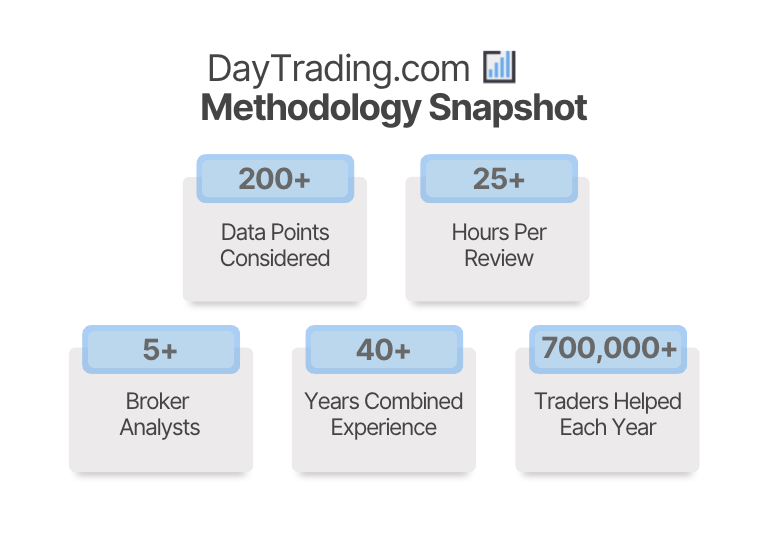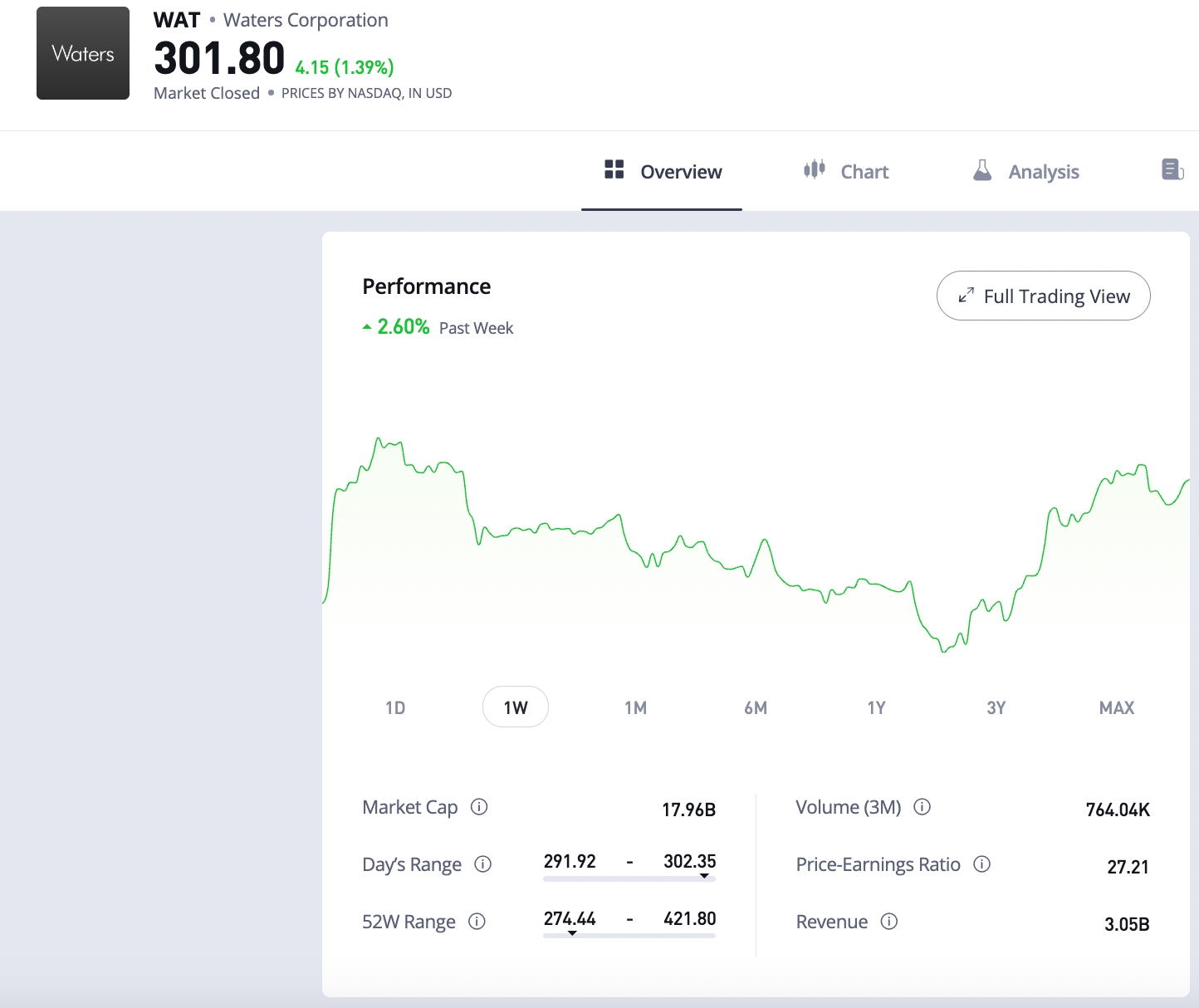Best Brokers for Trading Water 2026



Water is becoming one of the most critical commodities. With climate change, shifting rainfall patterns, and growing demand from agriculture and industry, water scarcity is no longer a distant issue. Traders have started to see water not just as a resource, but as a market with real investment potential.
The launch of the Nasdaq Veles California Water Index Futures (NQH2O) on the Chicago Mercantile Exchange was a turning point. For the first time, we could directly trade water price exposure, much like oil, natural gas, or wheat. That has opened up opportunities for traders who want to bet on scarcity trends.
When we began testing water futures through leading brokers, we noticed two things: liquidity is still developing, but access is expanding fast. More brokers are now making NQH2O available to retail traders.
Dig into our pick of the best brokers for trading water futures, stocks and ETFs, drawing on our tests.
Top 2 Brokers For Trading Water
Following our hands-on tests, these brokers stand out if you want to trade water futures, clean water technology firms, and water-themed ETFs:
Why Are These Brokers The Best For Water Trading?
Here's a rundown of why we rate these platforms as the top providers for water trading:
- Interactive Brokers is the best broker for water futures, stocks and ETFs in 2026 - In our tests, Interactive Brokers gave us direct access to Nasdaq Veles California Water Index (NQH2O) futures, while also covering global water ETFs like PHO, FIW, and PIO. Execution speed was excellent - even on limit orders placed during thinner liquidity windows. What stood out was the professional-grade toolset: real-time data, multi-leg order support, and advanced charting that let us monitor correlations between futures and water utility stocks side by side.
- XTB - XTB doesn’t offer direct NQH2O futures, but for ETF and stock-based water strategies it’s a solid, low-cost choice. In our tests, placing trades on thematic ETFs like PHO and FIW was seamless, and platform tools like price alerts and clean charting made it easy to positions. If your goal is to ride the broader water investment theme through equities and ETFs rather than diving into futures, XTB offers a straightforward entry point.
How Trusted Are The Best Water Trading Brokers?
Water traders need secure accounts. Here’s how our top brokers ensure compliant access to global water futures, equities and ETFs:
| Broker | Trust Rating | Guaranteed Stop Loss | Negative Balance Protection | Segregated Accounts |
|---|---|---|---|---|
| Interactive Brokers | ✘ | ✔ | ✔ | |
| XTB | ✔ | ✔ | ✔ |
Are The Best Water Brokers Good For Beginners?
New to water futures, ETFs and utilities stocks? We assessed education, demo accounts, and support to find how our top choices help beginners:
| Broker | Demo Account | Minimum Deposit | Minimum Trade | Education Rating | Support Rating |
|---|---|---|---|---|---|
| Interactive Brokers | ✔ | $0 | $100 | ||
| XTB | ✔ | $0 | 0.01 Lots |
Are The Top Water Brokers Good For Experienced Traders?
Seasoned traders need access to water futures, global equities, sector ETFs, advanced order types, and efficient execution. Here’s where our top firms excelled:
| Broker | Automated Trading | VPS | AI | Pro Account | Leverage | Low Latency | Extended Hours |
|---|---|---|---|---|---|---|---|
| Interactive Brokers | Capitalise.ai, TWS API | ✘ | ✔ | ✘ | 1:50 | ✔ | ✔ |
| XTB | - | ✘ | ✘ | ✔ | 1:30 (EU) 1:500 (Global) | ✔ | ✘ |
Compare Detailed Ratings Of Top Water Brokers
See how the leading water trading platforms performed in each main testing area:
| Broker | Trust | Platforms | Assets | Mobile | Fees | Accounts | Research | Education | Support |
|---|---|---|---|---|---|---|---|---|---|
| Interactive Brokers | |||||||||
| XTB |
Compare Trading Fees
Costs matter for water investing, especially for active traders. Compare trading fees across our top brokers:
| Broker | Cost Rating | Fixed Spreads | Inactivity Fee |
|---|---|---|---|
| Interactive Brokers | ✘ | $0 | |
| XTB | ✘ | €10 per 365 days |
How Popular Are The Top Water Investing Platforms?
Water investing is gaining momentum. We looked at user numbers to see which brokers attract the most traders:
| Broker | Popularity |
|---|---|
| Interactive Brokers | |
| XTB |
Why Use Interactive Brokers To Trade Water?
"Interactive Brokers is one of the best brokers for advanced day traders, providing powerful charting platforms, real-time data, and customizable layouts, notably through the new IBKR Desktop application. Its superb pricing and advanced order options also make it highly attractive for day traders, while its diverse range of equities is still among the best in the industry."
Christian Harris, Reviewer
Interactive Brokers Quick Facts
| Demo Account | Yes |
|---|---|
| Instruments | Stocks, Options, Futures, Forex, Funds, Bonds, ETFs, Mutual Funds, Cryptocurrencies |
| Regulator | FCA, SEC, FINRA, CFTC, CBI, CIRO, SFC, MAS, MNB, FINMA, AFM |
| Platforms | Trader Workstation (TWS), IBKR Desktop, GlobalTrader, Mobile, Client Portal, AlgoTrader, OmniTrader, TradingView, eSignal, TradingCentral, ProRealTime, Quantower |
| Minimum Deposit | $0 |
| Minimum Trade | $100 |
| Leverage | 1:50 |
| Account Currencies | USD, EUR, GBP, CAD, AUD, INR, JPY, SEK, NOK, DKK, CHF, AED, HUF |
Pros
- The new IBKR Desktop platform takes the best of TWS while adding bespoke tools like Option Lattice and Screeners with MultiSort to create a genuinely impressive trading experience for day traders at every level.
- IBKR continues to deliver unmatched access to global stocks with tens of thousands of equities available from 100+ market centres in 24 countries, most recently the Saudi Stock Exchange.
- There's a vast library of free or paid third-party research subscriptions catering to all types of traders, plus you can enjoy commission reimbursements from IBKR if you subscribe to Toggle AI.
Cons
- You can only have one active session per account, so you can’t have your desktop program and mobile app running simultaneously, making for a sometimes frustrating trading experience.
- Support can be slow and frustrating based on tests, so you might find it challenging to reach customer service representatives promptly or encounter delays in resolving issues.
- TWS’s learning curve is steep, and beginners may find it challenging to navigate the platform and understand all the features. Plus500's web platform is much better suited to new traders.
Why Use XTB To Trade Water?
"XTB stands out as a top choice for new day traders with the terrific xStation platform, low trading costs, no minimum deposit, and excellent educational tools, many of which are seamlessly integrated into the platform. "
Christian Harris, Reviewer
XTB Quick Facts
| Demo Account | Yes |
|---|---|
| Instruments | CFDs on shares, Indices, ETFs, Raw Materials, Forex currencies, cryptocurrencies, Real shares, Real ETFs |
| Regulator | FCA, CySEC, KNF, DFSA, FSC |
| Platforms | xStation |
| Minimum Deposit | $0 |
| Minimum Trade | 0.01 Lots |
| Leverage | 1:30 (EU) 1:500 (Global) |
| Account Currencies | USD, EUR, GBP |
Pros
- Opening an XTB account is a hassle-free, entirely online process that takes just a few minutes, making the entry into day trading smooth for new traders.
- The xStation platform continues to impress with its user-friendly interface and intuitive features, including customizable news feeds, sentiment heatmaps, and trader calculator, reducing the learning curve for newer traders.
- With an excellent range of educational materials, including training videos and articles integrated into the platform, XTB supports traders at all levels.
Cons
- The research tools at XTB are good but could be great if they went beyond in-house features with access to leading third-party tools such as Autochartist, Trading Central and TipRanks.
- XTB does not offer a raw spread account, which is becoming increasingly common among competitors like Pepperstone, and may disappoint day traders looking for the tightest spreads.
- Trading fees are competitive with average spreads of around 1 pip on the EUR/USD but still trail the cheapest brokers like IC Markets, plus there's an inactivity fee after 12 months.
How DayTrading.com Chose The Best Brokers For Trading Water
When we narrowed down the best brokers for water trading, we didn’t just look at the marketing claims. We ran our own hands-on tests, placing trades in both the NQH2O futures contract and water-themed ETFs to see how each platform stacked up.
Here are the main factors we focused on:
- Execution Speed and Reliability: Futures pricing can move fast, so we timed how quickly orders were filled. Interactive Brokers and IG consistently gave the smoothest execution with minimal slippage.
- Costs and Margins: Trading futures comes with commissions and margin requirements. We found Interactive Brokers offered flexible margin options for different account sizes. For water ETFs, brokers like XTB and eToro stood out with competitive spreads.
- ETF and Stock Access: Not every broker gives you water futures, but most offer ETFs and water-related stocks. We tested access to water-related ETFs such as PHO, FIW, and PIO, plus leading utility and water infrastructure stocks. We found XTB and IG were particularly strong here.
- Platform Usability: It’s not just about access. We tested the platforms ourselves to see how easy it was to place futures orders, manage risk, and chart price movements. IG‘s platform was user-friendly, while Interactive Brokers provided depth for more advanced traders.
- Trading Scenarios: To simulate actual trading conditions, we tested a mix of long-term ETF holdings, single-stock trades, and short-term futures positions. This allowed us to see how brokers handled liquidity, volatility, and multi-product portfolios.
- Research Tools: Because water futures are still emerging, good broker-provided research and customer support were critical. Water is a niche market, so finding useful analysis is harder than with gold or oil. We rated brokers higher if they offered thematic research, ETF screeners, or direct CME market data to support trading decisions.

The Key Water Futures Contracts You Can Trade
The most important contract in the water market is the Nasdaq Veles California Water Index Futures (NQH2O), listed on the Chicago Mercantile Exchange. This contract tracks the price of water in California – one of the most water-stressed and agriculturally significant regions in the world.
Each futures contract represents 10 acre-feet of water, roughly 3.26 million gallons, and prices are quoted in US dollars per acre-foot. For traders, that means you can take positions based on expected changes in California water prices without ever needing to own or move physical water.
When we tested access across brokers, this was the single futures product consistently available. It is still early days in the water futures market, and liquidity is thinner compared to energy or grain contracts. That said, we noticed that execution quality on NQH2O has improved in recent years, with tighter spreads on larger platforms.
For traders looking beyond futures, some brokers also provide access to water-related ETFs and utility stocks that are indirectly tied to the same theme.
How to Trade Water: Futures vs ETFs vs Stocks
Water is unusual compared to energy, metals, or grains – you can’t just buy barrels or bushels of it and store it. That’s why most traders approach water through financial products: either futures, exchange-traded funds (ETFs), or stocks linked to water infrastructure.
Futures (Direct Exposure)
The Nasdaq Veles California Water Index Futures (NQH2O) is the main contract. Futures give you direct exposure to water prices, but they also come with higher margin requirements and sharper volatility.
From our testing, execution worked best on larger futures firms such as Interactive Brokers and IG.
ETFs (Diversified and Accessible)
If you’re looking for a simpler way to trade the water theme, ETFs are the way to go. Some of the most popular include:
- Invesco Water Resources ETF (PHO) – Tracks US-listed water companies.
- First Trust Water ETF (FIW) – Focuses on global water management firms.
- Invesco Global Water ETF (PIO) – Covers water infrastructure worldwide.
- iShares Global Water ETF – Tracks the S&P Global Water Index.
Stocks (Targeted Exposure)
Finally, you can trade individual companies with strong exposure to water infrastructure, treatment, or utilities. Big names include American Water Works, Veolia Environnement, and Pentair.
Our testing showed that most multi-asset brokers list these stocks, so if you prefer equity-style exposure with earnings reports and dividends, this is the route.
Which is best?
From our experience, the choice depends on your style:
- Futures if you want leveraged, direct exposure.
- ETFs if you want diversified, lower-maintenance exposure.
- Stocks if you want to pick companies and track fundamentals.

Pros and Cons of Trading Water
Trading water isn’t the same as trading oil or gold – and that’s both an opportunity and a challenge. From our live testing and research, here’s how the balance looks:
Pros
- Exposure to a fast-growing, essential global theme
- Futures (NQH2O) provide direct access to water pricing
- ETFs make it simple to get diversified exposure to water companies
- Many brokers already offer water ETFs and stocks
- Useful for portfolio diversification outside of traditional commodities
Cons
- Futures market is still niche with lower liquidity
- Margin requirements can be steep for smaller traders
- Pricing is region-specific (California water index) and not global
- Limited research tools compared to energy or metals markets
- ETFs can dilute exposure with holdings not 100% focused on water

